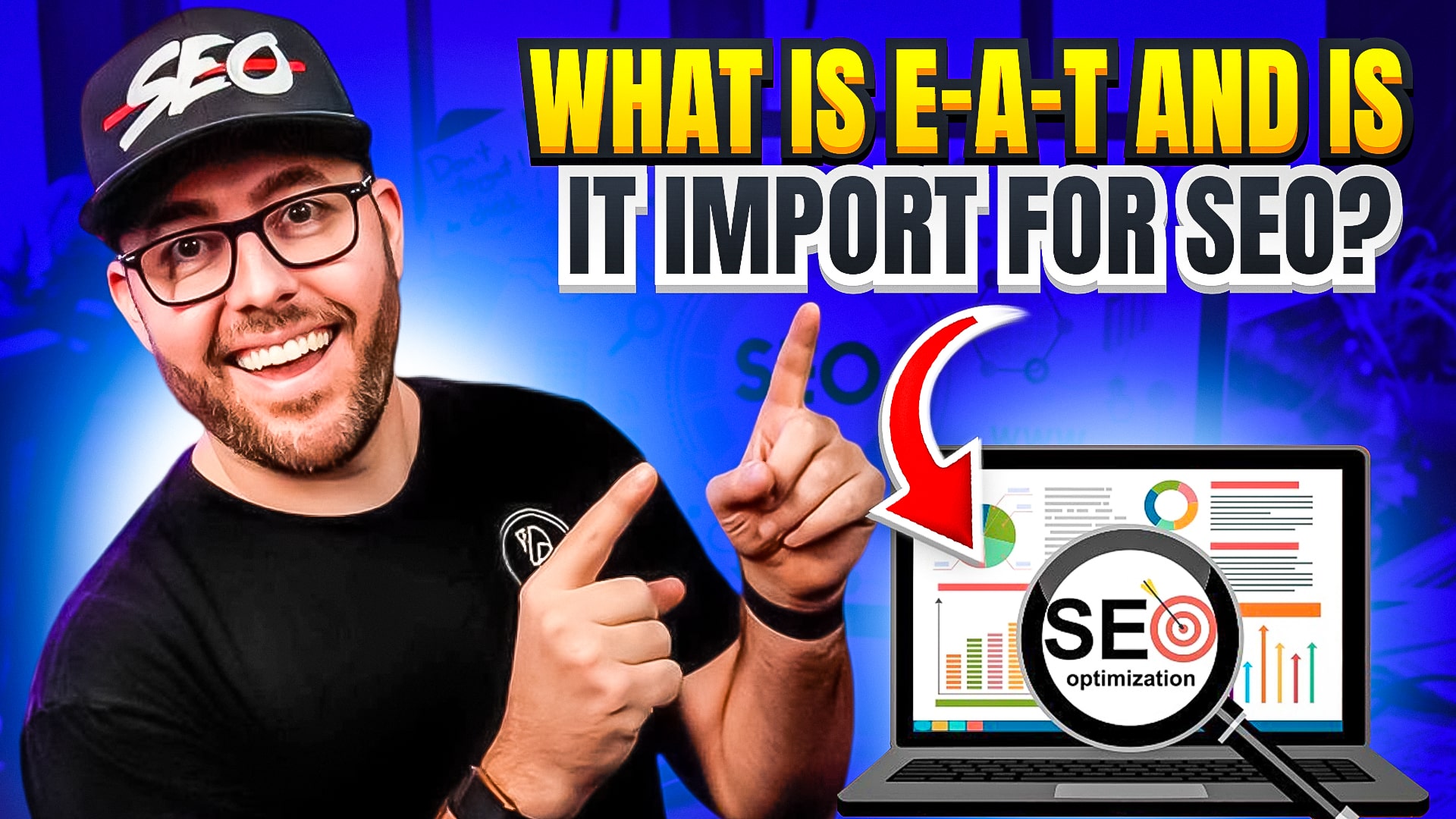
E-A-T has been a buzzword since August 2018. Since then, it’s been a mainstay in SEO articles.
Want to know what it is and how to leverage it for your SEO success? Then read on!
What is E-A-T?
Expertise, authoritativeness, and trustworthiness equal E-A-T. Google uses these criteria to evaluate the quality and credibility of a website and its content.
In 2013, the company published a document on E-A-T to help webmasters better understand what it looks for in a web page.
How Important Is E-A-T?
While E-A-T is essential for all queries, it matters more to some than to others.
For example, E-A-T won’t matter much when searching for subjective topics like “cute animals.”
However, when looking for specific information such as the correct dosage of medication while you’re sick or pregnant, E-A-T is vital. In such cases, you don’t want Google to give you results from inexperienced writers or untrustworthy websites without any authority on the subject matter.
To avoid surfacing inaccurate or misleading content whenever you search for important information, Google uses a term called YMYL, which means Your Money or Your Life.
YMYL topics are those that may impact your health, safety, financial stability, or future happiness. That means if you run a website centered around a YMYL topic, you have to demonstrate E-A-T.
How is E-A-T evaluated?
When researching “What is E-A-T”, understanding how it is evaluated is important.
While expertise, authoritativeness, and trustworthiness are similar concepts, they aren’t identical. Instead, they are each evaluated independently through a different set of criteria.
Let’s have an in-depth look at each:
Expertise
Expertise refers to a high level of knowledge or skill in any particular field. To evaluate content expertise, Google assesses whether the writer is a subject matter expert, someone with qualifications and relevant education. In other words, Google is looking for formal expertise.
For example, an ICU nurse is more qualified to write about life-saving CPR than someone who researches the topic online.
When it comes to medical, financial, or legal advice, formal expertise is crucial. However, for non-YMYL topics, life or everyday experience determines someone’s level of expertise.
For topics that don’t require formal expertise, Google looks at the content creator’s life expertise to assess whether they are enough of an expert on the topic. This way, they won’t get penalized for a lack of formal education in that field.
According to Google, “everyday expertise” is enough for certain YMYL topics, such as a query like “What does it feel like to be pregnant?” A pregnant woman is better suited to answer this question than a doctor who has never been pregnant but can demonstrate qualifications and formal training.
That means you can have everyday or life expertise in YMYL topics such as when posting in support websites and forums for certain diseases.
Authoritativeness
Authoritativeness equals reputation in a specific industry. In other words, someone who is viewed as the go-to source of information (such as an expert or influencer) on a given topic has authority.
Evaluating the authority of a website or individual is easy when you use the right tools and approach. Simply search the internet to get a clear picture of a person’s or website’s reputation.
One of the best ways to do this is through reputation research. Look what reviews, references, news articles, and other credible information created by real users and experts have to say about that individual or website.
Make sure to always look for independent sources and avoid information that was written or created by the website, individual, or the company itself. A great source of information that is often recommended by Google is Wikipedia.
Wikipedia articles boast a wealth of information about any given topic, company, and public personality and may also include information about their reputation. Awards and other forms of recognition, or controversies and issues are good indicators of someone’s reputation.
However, keep in mind that authority is a relative concept. While some people and websites may be authoritative sources of information in certain areas, they may have little to no authority in others.
For example, Warren Buffet may be a credible source when it comes to the stock market, finances, and investing, but he has no authority when it comes to marine biology.
Certain websites also hold unique authority over certain topics. The most authoritative website for Bruno Mars’ tour schedule is his official website and the most authoritative website for Covid-related travel restrictions in the US is that of the CDC.
Trustworthiness
Legitimacy, transparency, and accuracy of a website and its content – these key elements build trustworthiness.
To assess website trustworthiness, evaluators (or raters) take various factors into account. One of the most important ones is identifying who is responsible for the content on a site. While this is especially crucial for YMYL queries, it’s also relevant for non-YMYL queries.
Since YMYL websites must demonstrate a high level of trust, they should always indicate who is behind creating and publishing their content.
Another vital aspect, especially for YMYL topics and online stores, is having sufficient contact information, such as phone numbers and physical addresses. This allows users to easily reach out for support if they encounter any issues.
Raters also consider the accuracy of the content on a website. For example, news articles and information pages must demonstrate factually correct main content (MC) for a topic. They should also be supported by expert consensus where applicable.
An important part of this is citing trustworthy sources.
If an article offers a sufficient amount of accurate information and external references from trustworthy sources, it will typically be rated in the High range.
However, keep in mind that just like authority trust is a relative concept. No website or person can be perceived as trustworthy in all areas. For example, your website may be trustworthy when it comes to weight loss, but not car repairs.
Is E-A-T a Ranking Factor?
Whether expertise, authoritativeness, and trust are ranking factors for Google has been a topic of debate among SEO experts. According to Google’s Public Liaison of Search, Danny Sullivan, there’s no straightforward answer.
To be considered a ranking factor, a metric must be something that a computer can understand and evaluate.
Google can evaluate, crawl, and measure the number of backlinks to a page. However, while E-A-T contains desirable qualities of content, it’s essentially a human concept, meaning it’s difficult to translate into something that a computer can understand.
To address this, Google uses a three-step process:
- First, their search engineers develop algorithm tweaks that can improve search result quality.
- Second, they show search results to Quality Raters with and without the proposed change implemented, and ask them to provide feedback.
- Third, Google uses this feedback to decide whether the proposed tweak had a positive or negative impact on search results. Whenever they decide that the results are positive, they implement the change.
This process allows Google engineers to understand the tangible signals that align with E-A-T and adjust the ranking algorithms as needed.
Bottom line: E-A-T is not a direct ranking factor but instead a human interpretation of it used in the process of ranking.
E-A-T FAQs
Here’s a quick summary of what you’ve learned so far and other commonly asked questions.
What is E-A-T?
Google uses certain criteria to determine a website’s credibility and quality. These criteria are expertise, authoritativeness, and trust (E-A-T). When you improve E-A-T, it can help boost your website’s visibility in search results and your ranking for relevant keywords.
How can I improve my website’s E-A-T?
Improving your website’s E-A-T can be done by creating high-quality, informative content, having a professional design, writing an About Us page, being transparent about your authors, and having a privacy policy in place. Having customer reviews may also help improve your E-A-T.
How can I check my website’s E-A-T?
Unfortunately, Google doesn’t provide a way to check your website’s E-A-T. However, your search engine ranking, the quality of your content, and the number of backlinks to your website are all good indicators of how well your website is doing in terms of E-A-T.
Final Thoughts
This should cover everything you need to know to answer “What is E-A-T”?
E-A-T is crucial forboosting SEO and essential when it comes to covering YMYL topics.
Gaining and demonstrating E-A-T is a two-part process. The first step is to establish legitimacy, care about your customers, and establish corporate values. The second step is to demonstrate your expertise and values to Google.
While this may sound simple, it will take some time and effort to build E-A-T.
Keep in mind that running a website and regularly posting content won’t guarantee that you will rank higher. Google wants readers to find authoritative content first, thus it’s important you build trust, authoritativeness, and expertise to drive organic traffic to your site.
It’s also important to note that Google updates its Rater Guidelines often. This means that the criteria for E-A-T may change over time. So stay updated and adapt to the latest guidelines to improve your chances of ranking higher and driving more traffic to your site long-term.
